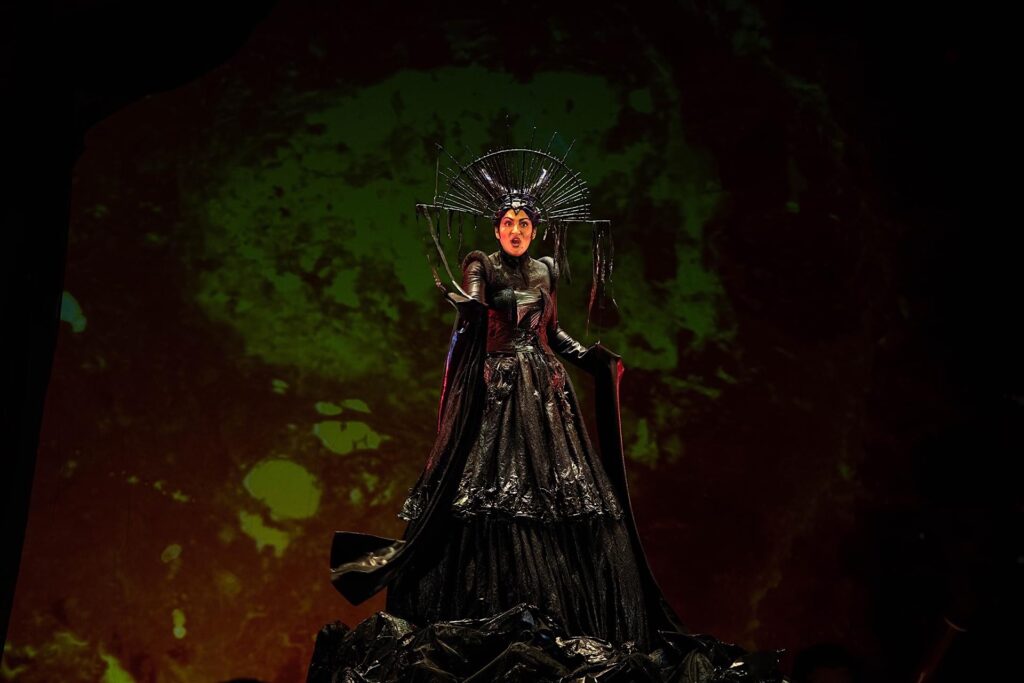The Queen of the Night could contain herself no longer.
“The stories keep raping and pillaging. We can’t seem to uplift any woman with any of these operas.”
“If they don’t die, they get married.”
“At it’s core, it’s all unadulterated perfect Jung.”
“Why keep bringing me back to push me down?”
“Don’t argue. Don’t say a word. Be good.”
“’You’re too tall. You’re too intense. Your voice is too loud.’ Yes. I know. This is opera. ‘Change your repertoire or change your personality. Do come back and sing for us again.’”
“Who is ‘They’? They are the trans opera singer standing before you. They are the lost, abandoned, forgotten.”
“Opera was never supposed to be like this.”
“They are here to say, ‘Enough!’ To forgive broken promises. They are not the problem. They are the solution.”
As avatars of the other, alter egos can be enormously empowering for any artist. For soprano Teiya Kasahara, Mozart’s dazzling envoy from the realm of magic and the occult has provided the trans, non-binary, interdisciplinary performer-creator with a spellbinding source of operatic inspiration as witnessed by their extraordinarily enthralling depiction of the character in their solo show, The Queen in Me, performed at the Canadian Opera Company Theatre last week.
The Magic Flute, the quirky, often enigmatic singspiel from which the Queen of the Night arises, was the last opera Mozart wrote. Premiered a scant two months before his death, the curious, boundlessly uninhibited 2-act moral discourse represents something of a summing up, a last intriguing chapter in a hugely creative career marked by frequent expressions of calculated musical subterfuge. With increasingly weary Enlightenment values still stubbornly in force across the Continent, the ex-wunderkind from Bavaria seized the opportunity to provide his audience with a final, thought-provoking investigation into the mechanics of goodness and love. Tempered and honed by a lifetime, albeit shockingly brief, of artistic service in the interests of the ruling elite, Mozart looked, not to the seemingly impervious social trope of his time — unthinking acceptance of all that could not be changed — but rather to the liberation of the human spirit. Never one to be unconditionally deferential — if the force of imperial power in La clemenza di Tito is ultimately upheld, The Marriage of Figaro thumbs a brash, metaphorical nose at authority — Mozart was, by nature, infinitely more inclined to defer to the power of simple truth and goodness than any complex set of prevailing social imperatives. Toffs be damned. The heart, not human intellect, is the true guide to happiness.
In a sense, the Queen of the Night is a harbinger of the future. With her furious attempts to tear down Sarastro, morally myopic High Priest in a quasi temple of reason, the Queen, all sensation and impulse, rails against her destiny, more proto-Romantic than rogue Rationalist. Sarastro enrages and exasperates her with his assumed air of pseudo mysticism wrapped in the veiled tenets of Freemasonry, his ubiquitous band of fanatical followers forever intent on preserving their perverse, male-centric cult. It is her lack of ascendancy as sorceress that particularly distresses, however, the consequence of her loss of den siebenfachen Sonnenkreis (“the sevenfold Sun Circle” — a frequent timing cut) usurped by Sarastro on her husband’s death, a shameless assault on her status as all-powerful wizard. A sorceress-sovereign once dethroned has no recourse to any court of law. The two mortal enemies nervously probe one another’s defences, primal forces of opposition locked in bitter psychological battle. One seeks freedom from convention. The other delights in rules. One celebrates the wonders of the cosmos. The other locks them away behind closed doors. Little wonder the Queen should be so outraged when daughter Pamina chooses to pursue Sarastro’s twisted path to love and happiness.
Vilified, distorted, denied meaningful dimension, the Queen of the Night has been grossly misunderstood for 230 years. Acknowledging a decades-old fascination with the character since first encountering Mozart’s fairytale monarch as a music student at UBC, Kasahara traversed considerable operatic terrain in their determination to set the record straight.
As the title of their startlingly original musical monologue would suggest, the Queen’s potent anima has quite clearly long infused their career. Singing a sweeping variety of familiar showpieces by Puccini, Donizetti, Verdi, Strauss and Massenet, the masterfully assertive, no nonsense 2SLGBTQIA+ singer/opera activist took laser-sharp aim at classical opera’s egregious attitude to women as fundamentally one-dimensional figures on stage — abused, theatrical caricatures to be manipulated and molded as required — quite literally stripping away layers of hypocrisy and chauvinism long associated with 18th and 19th century staples. Part bitter satire, part impassioned plea, Kasahara ruled, nowhere more forceful than in their powerful, poignant rendering of the Queen of the Night’s searing revenge aria, Der Hölle Rache.
The existential issues in play here are potentially profound. Denouncing the opera establishment and, by extension, attendant audience expectations is a decidedly risky proposition for any performer. An A-list artist’s livelihood is obviously dependent on the approval of both. To opt out of the conversation — dilemma number two — is essentially to uphold the status quo at a time when music theatre desperately needs a healthy dose of fresh energy and vision. If artistic criticism is to have any value, it must be informed and to be informed is to be involved. Bravery comes in many forms. Kasahara was and is positively fearless.
Anchored by an abundantly enthusiastic 18-player ensemble led by conductor Daniel Bartholomew-Poyser, with spectacular costume design by Joanna Yu, neo-psychedelic background FX by projection designer Laura Warren, The Queen in Me struck a deep, thoughtful chord. Thrilling, inspiring, savagely operatic, Teiya Kasahara gave urgent voice to a compelling need to move the beleaguered art form forward.


